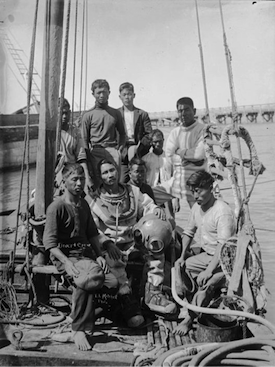Broome, Australia is a lovely beach resort town along the Indian Ocean in the NW part of the country. It’s known for white sands, sunset camel rides and the dinosaur tracks visible in the beach’s red rocks during low tide. But globally, over the last few years Broome has earned renown for something else entirely. Since the release of the Oscar-winning documentary The Cove in 2009, Broome has weathered intense international criticism because of its ties to Taiji, Japan.
In 1981, the town became sister-cities with Taiji, who at the time was not well known to the world. But to the people of Broome, ties to Taiji went back more than a century, and ran very deep. It was the coastal village in Japan from which many skilled divers had once migrated, to bolster Broome’s fast rising pearl shell industry.
By now, we’re all familiar with how every year the ‘fishermen’ of Taiji drive hundreds of dolphins into a cove to be sorted for sale or slaughter. The Cove triggered an intense campaign from around the world that targeted Broome because of its association with Taiji. Under intense pressure, councilors voted to suspend the sister-city relationship in September 2009. The community then went through two months of turmoil, including the cancellation of an annual parade that celebrates the local pearling history. Councilors then voted to reinstate ties, and Broome has been subjected to international scrutiny ever since.
It isn’t difficult to understand why people are horrified by the drive-hunting of dolphins at Taiji. So why would Australians want to associate themselves with such a controversial and almost universally reviled practice?
For a citizen of Broome, within the historical context, the perspective is quite different. The town was settled on the shores of Roebuck Bay after European colonizers realized the shallow seas were rich in pearl shell oyster. In short order, Asian people came to vastly outnumber people of European descent and Indigenous Australians. This lasted until World War II, with the largest section of Broome’s Asian community being Japanese.
In fact about 80% of pearling workers were from the prefecture of Wakayama (where the town of Taiji is located). In pearling at that time, workers were normally introduced and guaranteed by the head diver or someone else already established in the industry. This would spread into families and community groupings, and in time would be focused on certain areas. For Broome, that area was around the historic whaling town of Taiji. With the decline of that centuries-old industry, word got around that there were abundant diving and pearling opportunities in Broome’s booming pearl shell industry.
Broome’s history of being an Asian-majority town still shapes the modern community, and to this day many feel it would be impossible to cut ties to a place with such strong family connections. The relationship runs deep, and you can almost understand the eagerness to maintain ties. That is, until you’ve witnessed a typical scene in the cove between September and March.
So this brings about a moment of truth, when you must decide whether morality prevails over traditions, history, and even the deepest of community ties. It is not enough to simply say you don’t condone the hunts, and that your ties exist for entirely different reasons. That is not the message you end up sending out to the world. What you suggest to the international community is your tacit acceptance of the atrocities they can all see with their own eyes.
If you discovered that a family member has been robbing banks to finance a drug habit, you may continue to love him, and hopefully you’d want to help – but you would not endorse what he’s been doing. You might help him into rehab, and certainly you’d urge him to consider both the impracticality and the immorality of actions that harm others. Allowing him to continue his ways because he’s family would not be a rational course of action.
But this is exactly what the Shire of Broome, Australia is doing. Someone’s rights are being violated, but Broome’s endorsement of the relationship helps shield the perpetrators from the consequences of their actions. Remember, these are not fishermen, and dolphins are not fish. They are not commodities to be traded or carved up for food. They are highly intelligent beings who suffer enormously when we mistreat them. When we violate their rights.
The people of Broome should suspend their sister-cities relationship with Taiji, at least until that inevitable day that dolphins can swim safe and free in the waters off Wakayama. Don’t be the enabler that pushes that day further out into the future.
For The Orca’s Voice,
Phil, Canadian Cetacean Alliance



Leave a Reply